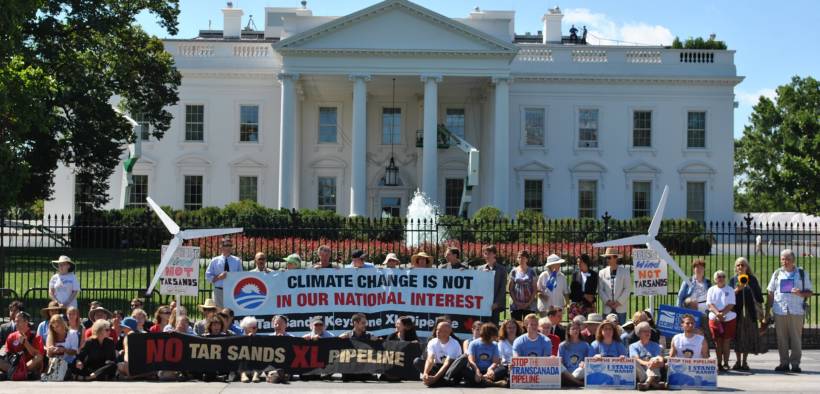Another Trump Proposal to Roll Back Climate Change Protections

“We may be in the midst of a national security crisis, but that is not stopping the administration from rolling back climate change regulations.”
While the majority of media attention focused on the U.S.’ escalating tension with Iran over the past week, the Trump administration submitted a proposal to end the consideration of climate change in the development of new infrastructure projects, continuing the administration’s vigorous rollback of environmental regulations in what may become the president’s greatest legacy.
“We may be in the midst of a national security crisis, but that is not stopping the administration from rolling back climate change regulations,” tweeted the New York Times’ Lisa Friedman.
The change would effectively overturn the 50-year-old National Environmental Policy Act (NEPA), which requires federal agencies to take into account environmental damage, water quality, and endangered species before developing new infrastructure. It would also eliminate a requirement for agencies to consider the “cumulative” consequences of new infrastructure proposals, meant to safeguard the environment for future generations.
“In recent years courts have interpreted that requirement as a mandate to study the effects of allowing more planet-warming greenhouse gas emissions into the atmosphere,” wrote Friedman. “It also has meant understanding the impacts of rising sea levels and other results of climate change on a given project.”
NEPA has been a persistent thorn in the side of the Trump administration, as courts have cited the law multiple times when blocking the Keystone XL oil pipeline and other fossil fuel projects. Notably, Keystone leaked approximately 383,000 gallons of crude oil in North Dakota in November.
The Washington Post reports that Trump is “particularly interested in the plan because he thinks it will accelerate the construction of pipelines across the country.” The Post reports that he also hopes it will help him win support from construction unions.
“POTUS is obsessed with pipelines,” an official told the Post. “He wants to get these pipelines built.”
Indeed, the Trump administration has already attempted to criminalize pipeline demonstrations and has signed two executive orders to speed the development of fossil fuel infrastructure across state and international borders. According to a Global Witness report from August, the U.S. is on track to produce 61 percent of the world’s new fossil fuel production over the next 10 years.
President Trump denies climate change and has worked to purge his administration of scientists. The EPA has fought to slash environmental regulations over the past three years, including asbestos, coal ash, chlorpyrifos, chemical disaster protection, glyphosate, methane, and carbon emission deregulations, as well as efforts to restrict science used in public policy.
“They’re clearly trying to institutionalize climate denial into federal decision-making,” Stephen Schima, senior legislative counsel for the nonprofit organization Earthjustice, told the Post. “This is the existential threat to how the government incorporates climate change into their decision-making process.”
Schima told the Post that the infrastructure rule change could have enormous consequences because NEPA “sets the floor” for how more than 80 federal agencies evaluate infrastructure development. Other experts predicted similar negative ramifications.
“It has the potential to distort infrastructure planning by making it easier to ignore predictable futures that could severely degrade the projects,” Michael Gerrard, director of Columbia University’s Sabin Center for Climate Change Law, told the New York Times. Gerrard said developers would fail to prepare for rising sea levels if the change is finalized.
Brett Hartl, government affairs director for the Center for Biological Diversity, also condemned the change: “You’re assuming away massive amounts of harm and you’re not even going to discuss it.”
Once the proposed changes are filed in the federal register, the public will have 60 days to comment on them, an official told the New York Times. The official said a final regulation should be ready before the presidential election in November.















